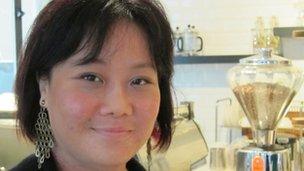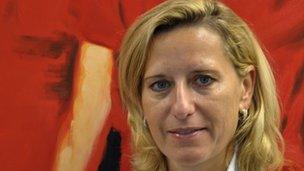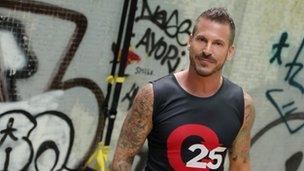Hong Kong entrepreneur finds opportunity in city’s darkest moment
- Published

Jennifer Liu's coffee shop chain Caffe Habitu will soon expand to Shanghai
A deadly virus and a hit movie - it's an unusual combination, but for Hong Kong entrepreneur Jennifer Liu they were crucial ingredients in her business success.
In 2003, she founded Caffe Habitu, a coffee chain, when Hong Kong's economy was at a low ebb following the outbreak of Severe Acute Respiratory Syndrome (Sars) that killed nearly 300 people in the city.
As other businesses took fright and commercial rents plunged, Ms Liu leased a plum spot in a new development in one of Hong Kong's busiest shopping districts.
"I really did put in a lot of hard work and a lot of sweat and tears," she says. "But being able to see Sars as an opportunity was key. It was unlucky for Hong Kong to have Sars but it was lucky for me."
Another big break came last year when one of her 20-strong chain of coffee shops featured in a romantic comedy called Don't Go Breaking My Heart, which was a box-office smash in China.
In the months following its release, Ms Liu said she fielded up to 200 inquiries a day from wannabe business partners in China.
She eventually selected a suitable partner and six branches are set to open in Shanghai, a move that could potentially allow Caffe Habitu to take on the likes of Starbucks in the world's biggest consumer market.
Entrepreneurial paradise?
Despite the success of her business, Ms Liu, an architecture graduate who founded an internet start-up before launching Caffe Habitu, says Hong Kong is not the entrepreneurial paradise that many might imagine.
Since Hong Kong was established as a British colony in 1842, commerce has been its lifeblood and its fortunes were built by a number of high-profile entrepreneurs, such as Asia richest man Li Ka-shing.
In many cases, they arrived from warn-torn China with nothing and created billion-dollar businesses from scratch.
Today the territory is part of China and acts as a gateway to its low-cost factories and increasingly rich consumers.
With its low taxes and light regulation, Hong Kong ranks second in the World Bank's "ease of doing business survey", and has been deemed the world's freest economy for the past 18 years by the Heritage Foundation.
Despite all these strengths, the government's hands-off approach can mean that established big businesses dominate and new start-ups struggle to be taken seriously.
Ms Liu says her lowest point came when a commercial landlord decided not to renew Caffe Habitu's lease in one of its most lucrative locations.
"They put up the rent and we were willing to pay but they told us that they needed to attract Chinese tourists who want to see international brands," says Ms Liu.
"It was sad. For the first time, I realised that being a home-grown company had its limitations."
Funding headaches
Although Hong Kong rivals New York and London as a global financial centre, raising funds is also a major problem for start-ups.

Ilse Massenbauer-Strafe says that banks in Hong Kong don't like lending to start-ups
None of the three entrepreneurs I spoke to had been able to obtain a business loan from a bank, instead relying on existing pools of capital, friends and family for seed money.
Ilse Massenbauer-Strafe, originally from Austria, founded Hong Kong-based air purification company Oxyvital with her husband in 1998.
While developing the technology that she sells to hotels, offices and spas to counter the city's deteriorating air quality, she was forced to use her own apartment as collateral to secure a loan.
"I hear Hong Kong is so easy to set up a business and, yes, it is easy to register a company," says Ms Massenbauer-Strafe.
"But there is no way you can go to a bank and say: 'Look, we have this fantastic business plan, patents... please can we have 30 million Hong Kong dollars ($3.9m; £2.5m) to set up a factory in China?'"
It is something the government acknowledges is a problem and is seeking to address. One radical new step is a microfinance scheme that is set to launch later this year.
Such schemes are more commonly found in developing countries but are increasingly viewed as a way to foster entrepreneurship in wealthier places.
Hong Kong will offer five-year loans of up to HK$300,000, with a one-year repayment holiday to start-ups and businesses that have been in operation for less than five years.
"There are many in Hong Kong who aspire to set up their own businesses or enhance their skills," says Peter Pang, deputy chief executive of the Hong Kong Monetary Authority.
"While the start-up funding needed may not necessarily be substantial, many often find if difficult to borrow from the traditional financing channels to realise their development potential."
Novel solution
The other difficulty commonly cited by entrepreneurs is the city's high rents for offices, retail and living space.

Davide Butson-Fiori launched a "boot camp" fitness training business in Hong Kong in 2010
Davide Butson-Fiori has found a novel solution to this perennial problem - his business operates in the open air.
He launched a "boot camp" group fitness training company called Circuit25 in July 2010, with classes taking place in Hong Kong's parks and public sports grounds. He is expanding the concept to Singapore and Los Angeles.
A photographer and designer by profession, he ran classes in his spare time as a hobby until one of his clients, an investment banker, offered to become his business partner with a HK$1m investment.
It's this open-minded, can-do attitude to business that outweighs the challenges of launching a start-up in Hong Kong, says Mr Butson-Fiori.
"I would have tried to do it somewhere else, but I think it's been easier to do it here in Hong Kong."